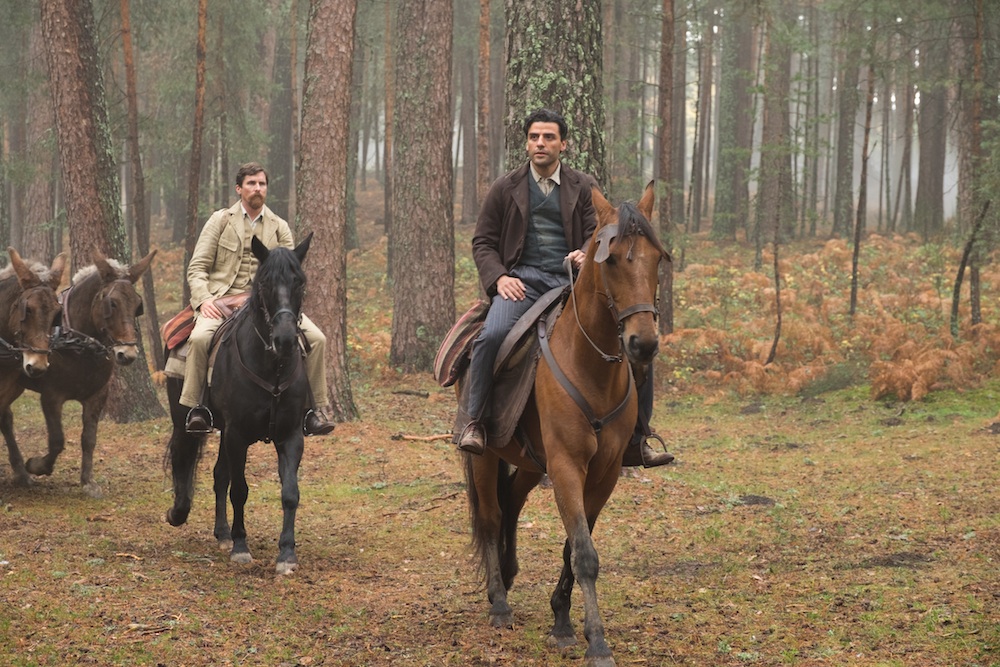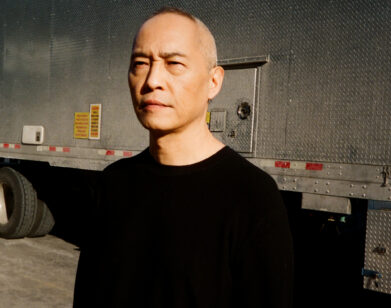Untold Histories
In The Promise, Belfast-born director and co-writer Terry George uses a love triangle to present an overview of the Armenian genocide. Set in a crumbling Ottoman Empire during WWI, every character has his or her part to play in a grander political history. There is Mikael (Oscar Isaac), an Armenian apothecary who moves to Constantinople to attend medical school; Ana (Charlotte Le Bon), the compassionate, Paris-educated Armenian tutor with whom Mikael falls in love; Ana’s boyfriend Chris (Christian Bale), an earnest American journalist determined to document the atrocities he witnesses; and Emre (Marwan Kenzari), a wealthy Turk torn between his cosmopolitan outlook and conservative father.
George, who splits his time between Long Island and Belfast, jokes that he’s “cornered the market” when it comes to controversial conflicts. His first film, In the Name of the Father (1993), featured Daniel Day-Lewis as Gerry Conlon, a man wrongly convicted of bombing a Guilford pub in the name of the Provisional IRA, and earned George an Oscar nomination for Best Adapted Screenplay alongside director Jim Sheridan. In 2004, George was nominated for his second Academy Award for Hotel Rwanda, the biopic of hotel manager Paul Rusesabagina during the Rwandan genocide, starring Don Cheadle and Sophie Okonedo.
EMMA BROWN: I read that before The Promise you were looking into doing a biopic of a bishop who survived the Armenian genocide.
TERRY GEORGE: There is a book called Armenian Golgotha, the memoir of Bishop Grigoris Balakian translated by his great-grandson Peter Balakian, who is a renowned poet and scholar. Initially, some Armenians had asked me to investigate that, and I started working on a script and went to Yerevan and Istanbul and did research. As they were struggling to get that made, this script arrived—what was then called Anatolia and is now The Promise. My agents knew I was interested in the subject, so that’s how I got into this.
BROWN: So it was pure coincidence?
GEORGE: Yeah. The producers knew nothing about the Armenian project, but approached me because of Hotel Rwanda, I guess.
BROWN: After Hotel Rwanda, what was the first project along those lines that someone approached you with?
GEORGE: After Hotel Rwanda, I was trying to get a feature film made about a U.N. Diplomat called Sérgio Vieira de Mello who was assassinated in Baghdad [in 2003]. He was the James Bond diplomat of the U.N. and had been involved in Bosnia-Herzegovina, Cambodia, Rwanda, East Timor, and then Iraq. That was a project I was trying to get off the ground, which I think is now getting made with another director. Being offered this opportunity to do a feature set during the Armenian genocide, it was something that I knew hadn’t been covered by Hollywood or the mainstream film world.
BROWN: Did you know Robin Swicord, the screenwriter, before you started working on The Promise?
GEORGE: No, I didn’t. I knew of her; she’s from Ireland and she’s a big figure in the Academy and so forth, but basically her script was just handed to me and I went to work. We didn’t really have any communication at all. I just took it and adapted it. Her script had, not a straightforward love story, but a love story between Mikael and Ana, and I introduced the Chris character. Because the characters of Ana and Mikael experience the genocide first hand, their story wasn’t able to encompass the broader macro-story of the politics of it and the worldwide events that went on. The Chris character, as well as being part of the love triangle, became the vehicle for telling the greater political story.
BROWN: When you make a movie about something like this that means a lot to people, do you have a different goal in mind?
GEORGE: I guess you do. It’s a two-edged sword in that it certainly helps focus you and gives it a gravitas that can lift people up and say, “We’re doing something worthwhile here.” Particularly with this film, it was a really tough slog; we were doing something that should have taken 120 days in 70 days, so you really had to push everyone. So there’s that aspect of it of enabling you to channel everyone’s efforts and encourage them. The other side of it is that it’s an onerous responsibility to get the story right and make sure that you can defend the veracity of the events you portray. The whole Armenian population had been waiting for a film like this to be told, and I was crucially aware that I had to get these historical facts in. We had this love story that was given to me, and the producers liked this format of the script, so all of these things had to be compressed together. Rather than devote myself to stylizing the film and aesthetically pleasing film buffs, there was a greater purpose in serving the storytelling of it and the history of it, particularly for the Armenian population. We felt that this story had never been told, so it was definitely directed from that point of view.
BROWN: One thing people talk a lot about in film and television today is, “Who has the right to tell what story?” Do you feel like not having a personal involvement attachment to the Armenian genocide made it easier for you?
GEORGE: Yeah, I do. I think that having outsider perspective on it helps you. First of all, it helps you crystallize and distill the story down and not fixate on particular issues that you think are important, but that you can’t universalize. It helped me a lot with Hotel Rwanda. I recognize from Northern Ireland the ability of extremist politicians in particular to manipulate the fears of sections of the population, one against the other. From Northern Island to Rwanda to Armenia, you can see the modus operandi right through—a common thread. Don Cheadle and I, during Hotel Rwanda, had a watchword, a kind of mantra, and that was “Peoria.” What we meant was: if they don’t get this film in Peoria, Illinois, which is the center of the United States, we’ve failed. You’re trying to communicate to an audience that has no knowledge of it and probably no interest, really, and so being an outsider allows you to work on that perspective.
BROWN: Do you think that you can create a film that both speaks to the people in Peoria, Illinois, and Armenians whose grandparents went through it?
GEORGE: Yeah. If I didn’t think that, I’d pack it in. That was the objective that Jim Sheridan and I had with In the Name of the Father. It was the objective with Hotel Rwanda and with The Boxer. Sometimes, depending on how the dice fall, you hit, and sometimes you don’t, but I think our goal has always been to universalize the story. I always go after the ordinary man or woman, often flawed, who, when confronted with a great catastrophe or a monumental event, finds within themselves the greatness to overcome the struggle they’re involved in, and that is a universal story.
BROWN: One of the characters I found particularly interesting in The Promise was Emre. He’s fascinating.
GEORGE: A fascinating character and a brilliant actor. Marwan [Kenzari] is a star. But I wanted a character that was cosmopolitan. Emre clearly doesn’t like his father and his father’s politics; he has a western sensibility. He’s steeped in this Ottoman nationalism, and he’s desperately trying to escape that. He has this devil-may-care attitude, but deep down, his decency keeps overwhelming him. Ultimately, he’s the most tragic character. Every time he tries to do the right thing, it bites him in the ass. I didn’t want to have a cliché guy who steps in like a sergeant or something—I wanted to have a character that Marwan could get his teeth into, and he pulled it off beautifully.
BROWN: You’ve said that you tried to fly under the radar while making The Promise. Is that hard when you have such big-name actors?
GEORGE: It’s not as hard as you think. Christian [Bale] is a family man—he’s totally devoted to his family. He’s not interested in nightlife and going out and any of that stuff. He wants to do his work, go home to his family, and enjoy that. His life is spent flying under the radar. And Oscar [Isaac] wants to plunge into the work. So when you have actors who are not putting themselves in front of the press, it’s not that big a problem. It’s just a matter of wrangling the paparazzi when they show up at a certain place and being sure that we don’t generate any unwanted attention by causing a stir anywhere.
BROWN: When you were going to places like Istanbul for research, did you think, “I probably won’t be able to come back here”?
GEORGE: Yes, I did, and I enjoyed the place. I was actually with an Armenian guy who was having a really hard time being there. I can’t go there, I can’t go to Iran or Rwanda anymore. Luckily, I can still go to London. [laughs] But it’s troubling. I’d like to think I could, but given President Erdogan and Turkish nationalism that he’s fostered—there’s a law against insulting Turkishness, which I figure I’ve done.
I talked about this in the press conference, [but] I think that the Turkish nation is the best example of institutionalizing what I call “The O.J. Syndrome.” O.J. Simpson, I believe, genuinely believed that he didn’t kill his wife. And yet, we all know he did. He got off by court. The successive Turkish governments have so re-written the history books and revised history that they genuinely believe themselves, deep down. They’ve created a national consciousness that, “No, we didn’t do this. We didn’t try to wipe out this nation.” Whereas, the facts are right there. It does seem sort of ridiculous, but, at the same time, it undermines the recognition of genocide in, say, Northern Iraq, with the Yazidis. It’s an ongoing battle and I think they have to, at some point, step up and recognize what it is and then try to move forward from that.
BROWN: How do you move forward?
GEORGE: I remember when I got into filmmaking, the head of Universal said, “There are three subjects that I won’t do: South Africa, Northern Ireland, and Palestine.” Now, I didn’t do South Africa, but I shot in South Africa. Those three crises were considered intractable and two of them have been resolved, so there’s nothing intractable if people are willing to sit down and talk. Not talk about, as the Turks want to, “Let’s see if it really happened,” [but] recognize what went on and say, “How do we move forward?”
THE PROMISE IS OUT NOW.







